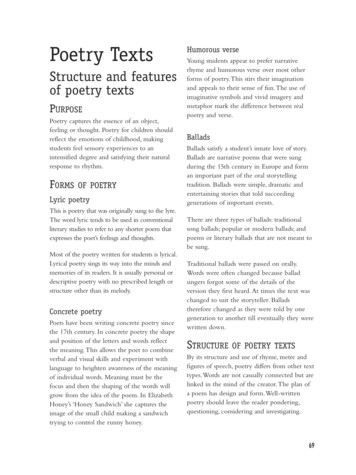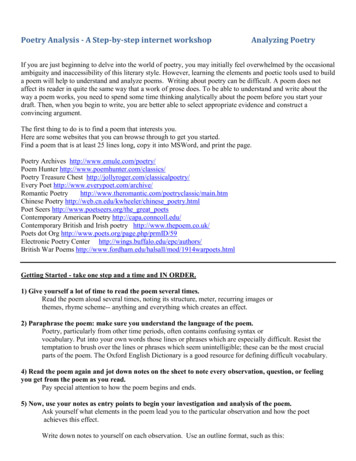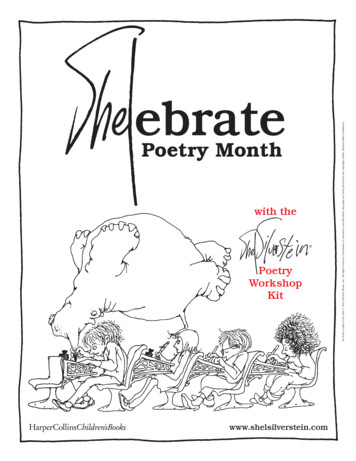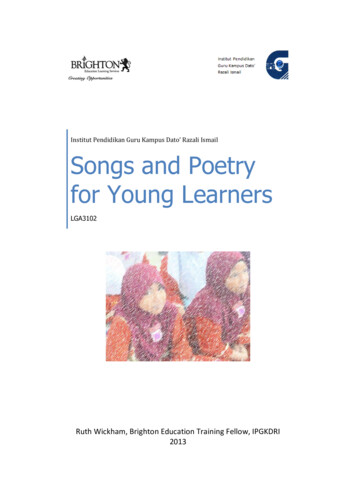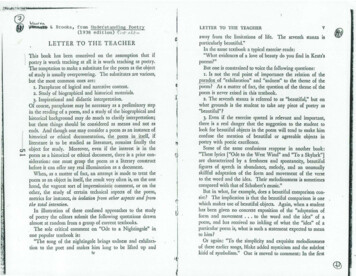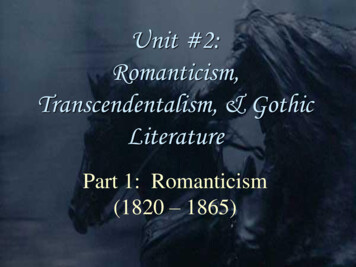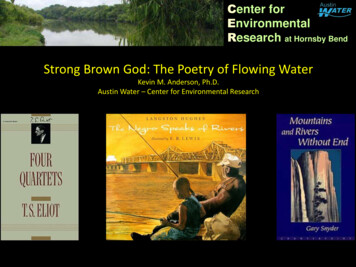
Transcription
Center forEnvironmentalResearch at Hornsby BendStrong Brown God: The Poetry of Flowing WaterKevin M. Anderson, Ph.D.Austin Water – Center for Environmental Research
Fluvial Mythology and Rivers: Lethe and StyxStyx - The Styx (also meaning "hate" and "detestation“adjectival form: Stygian) is a river in Greek mythology thatformed the boundary between Earth and the Underworld(often called Hades which is also the name of this domain'sruler). In order to cross the River Styx and reach Hades, adead person must pay a fee to the ferryman, Charon. If thecorrect fee is paid, Charon will take the dead across. If thedead cannot afford the fee, however, they will be forced towander the banks of the River Styx as Wraiths for eternity.Crossing the River StyxGustave Dore 1861Lethe - In Greek mythology, Lethe was one of the five rivers ofHades. All those who drank from it experienced completeforgetfulness. Lethe was also the name of the Greek spirit offorgetfulness and oblivion.Both rivers are part of thegeography of Dante’sDivine ComedyDante in the LetheGustave Dore 1861
Crossing the Styx - The Myth of OrpheusOrpheus was a legendary musician, poet, and prophet in ancient Greek religion and myth.The major stories about him are centered on his ability to charm all living things with his music.The love and loss of Eurydice and the death of Orpheus involves the passage over and into rivers.Auguste RodinOrpheus & Eurydice (1887)OrpheusRoman mosaic
“But you, divine one singing on the brink of destructionwhile legions of forsaken maenads tore at your flesh;you vanquished their shrieks with harmony, oh bright one,while from utter devastation rebounded your song afresh.And though you fade from earthly sight,declare to the silent earth: I flow.To the rushing water say: I am.”Rainer Maria Rilke 1875–1926The Sonnets to Orpheus 1922The Death of OrpheusJohn William Waterhouse (1849–1917)"Nymphs Finding the Head of Orpheus"1900
Fluvial Mythology and PoetryT.S. Eliot 1888-1965Four QuartetsWater as the eternal agentof birth and death“The Dry Salvages”I do not know much about gods; but I think that the riverIs a strong brown god—sullen, untamed and intractable,Patient to some degree, at first recognized as a frontier;Useful, untrustworthy, as a conveyor of commerce;Then only a problem confronting the builder of bridges.The problem once solved, the brown god is almost forgottenBy the dwellers in cities—ever, however, implacable.Keeping his seasons and rages, destroyer, reminderOf what men choose to forget. Unhonored, unpropitiatedBy worshippers of the machine, but waiting, watching and waiting.His rhythm was present in the nursery bedroom,In the rank ailanthus of the April dooryard,In the smell of grapes on the autumn table,And the evening circle in the winter gaslight.The river is within us
Fluvial Mythology and Poetry“The River of Rivers in Connecticut”There is a great river this side of StygiaBefore one comes to the first black cataractsAnd trees that lack the intelligence of trees.In that river, far this side of Stygia,The mere flowing of the water is a gayety,Flashing and flashing in the sun. On its banks,No shadow walks. The river is fateful,Like the last one. But there is no ferryman.He could not bend against its propelling force.It is not to be seen beneath the appearancesThat tell of it. The steeple at FarmingtonStands glistening and Haddam shines and sways.It is the third commonness with light and air,A curriculum, a vigor, a local abstraction . . .Call it, one more, a river, an unnamed flowing,Space-filled, reflecting the seasons, the folk-loreOf each of the senses; call it, again and again,The river that flows nowhere, like a sea.Wallace Stevens 1879-1955
Fluvial Mythology for South America - Pablo Neruda1904-1973“The Rivers Come Forth/ The Rivers Emerge” “Los ríos acuden”Lover of the rivers, assailedBy blue water and transparent drops,Like a tree of veins your specterOf a dark goddess biting apples:And then awakening nakedYou were tattooed by the rivers,And in the wet heights your headFilled the world with new dew.Water trembled on your waist,You are made of springsAnd lakes glisten on your forehead.From your maternal density you drewThe water like vital tearsAnd dredged the sandy riverbedsAcross the planetary night,Crossing rough, dilated stone,Shattering on the wayAll the salt of geology,Cutting forests of compact wallsDislodging the muscles of quartz.Amada de los ríos, combatidapor agua azul y gotas transparentes,como un árbol de venas es tu espectrode diosa oscura que muerde manzanas:al despertar desnuda entonces,eras tatuada por los ríos,y en la altura mojada tu cabezallenaba el mundo con nuevos rocíos.Te trepidaba el agua en la cintura.Eras de manantiales construiday te brillaban lagos en la frente.De tu espesura madre recogíasel agua como lágrimas vitales,y arrastrabas los cauces a la arenaa través de la noche planetaria,cruzando ásperas piedras dilatadas,rompiendo en el caminotoda la sal de la geología,cortando bosques de compactos muros,apartando los músculos del cuarzo.
Fluvial History for North America“The Negro Speaks of Rivers”I’ve known rivers:I’ve known rivers ancient as the world and older thanThe flow of human blood in human veins.My soul has grown deep like the rivers.I bathed in the Euphrates when dawns were young.I built my hut near the Congo and it lulled me to sleep.I looked upon the Nile and raised the pyramids above it.I heard the singing of the Mississippi when Abe LincolnWent down to New Orleans, and I’ve see itsMuddy bosom turn all golden in the sunset.I’ve known rivers:Ancient, dusky rivers.My soul has grown deep like the rivers.Langston Hughes 1902-1967"The Negro Speaks of Rivers"was composed in 1920 on thetrain to Mexico when Hugheswas still in his teens (eighteento be exact), and published ayear later in Crisis.
Fluvial History for North America“Another River”W. S. Merwin 1927-2019The friends have gone home far up the valleyof that river into whose estuarythe man from England sailed in his own agein time to catch sight of the late forestsfurring in black the remotest edgesof the majestic water always itappeared to me that he arrived just asan evening was beginning and toward the endof summer when the converging surfacelay as a single vast mirror gazingupward into the pearl light that wasalready stained with the first saffronof sunset on which the high wavering trailsof migrant birds flowed southward as though there wereno end to them the wind had dropped and the tideand the current for a moment seemed to hangstill in balance and the creaking and knockingof wood stopped all at once and the known voicesdied away and the smells and rockingand starvation of the voyage had becomea sleep behind them as they lay becalmedon the reflection of their Half Moonwhile the sky blazed and then the tide lifted themup the dark passage they had no name for
Fluvial LanguageA Linguistic SurfacewaterDeltaOxbowDischargeEstuaryMeanderPeak FlowFlood
Fluvial Language “Languages”There are no handles upon a languageWhereby men take hold of itAnd mark it with signs for its remembrance.It is a river, this language,Once in a thousand yearsBreaking a new courseChanging its way to the ocean.It is mountain effluviaMoving to valleysAnd from nation to nationCrossing borders and mixing.Languages die like rivers.Words wrapped round your tongue todayAnd broken to shape of thoughtBetween your teeth and lips speakingNow and todayShall be faded hieroglyphicsTen thousand years from now.Sing—and singing—rememberYour song dies and changesAnd is not here to-morrowAny more than the windBlowing ten thousand years ago.Carl Sandburg 1878–1967
Fluvial Landscapes“River Moons”The double moon,one on the high backdrop of the west,one on the curve of the river face,The sky moon of fireand the river moon of water,I am taking these home in a baskethung on an elbow,such a teeny-weeny elbow,in my head.Monroe meets Sandburg - December 1961I saw them last night,a cradle moon, two horns of a moon,such an early hopeful moon,such a child's moonfor all young heartsto make a picture of.The river - I remember this like a picture the river was the upper twistof a written question mark.I know now it takesmany many years to write a river,a twist of water asking a question.And white stars moved when the moon movedand one red star kept burning,and the Big Dipper was almost overhead.
Physical Geography and PoetryFluvial GeomorphologyA Fluvial Life
The Life of a River – William Morris Davis 1850-1934Davis “viewed the river system as having a life of its own. Its youthful headwaters are steep and rugged. It rushes toward the sea,eroding bed and bank on its way. In its central part, it is mature, winding sedately through wide valleysadjusted to its duty of transporting water and sediment. Near its mouth it has reached, in its old age, a nearly level plain throughwhich it wanders in a somewhat aimless course toward final extinction asit joins the ocean that had provided the sustaining waters through itswhole life span.”Luna Leopold “A Reverence for Rivers” 1977
Poetic Fluvial Geomorphology - A Fluvial LifeThe Upper Course: steep and ruggedThe Middle Course: winding sedately through wide valleysThe Lower Course: a somewhat aimless course toward final extinctionSinuosity is inversely proportional to slope
The Life of a River and Geology"If Anything Will Level With You Water Will”Stream shed out of mountains in a white rust(such the abomination of height)Slow then into upland basins or high marshAnd slow drop loose composed figurationsOn big river bottomsOr give the first upward turn from plains:Rock itself in a bound slurp or spillOr overthrust into very recent times:There waterlike stone, those heated seekings &Goings, cools to exact concentration, IMean the telling is unmediated:The present allows the reading of muchOld material: but none of it need be read:It says itself (andSaid itself) so to speak perfectly in itself.That’s for modern streams: if sediment’sLithified itMay have to be considered ancient, the result ofA pressing, perhaps lengthy, induration:Old streams from which the water’sVanished are interesting, I mean thatKind of tale,Water, like spirit, jostling hard stuff aroundTo make speech into one of its realest expressions:Water certainly is interesting (as is spirit) andSmall rock, a glacial silt, just as much so:But most pleasurable (magma & migma) isA.R. Ammons 1926-2001
The Life of a River and Hydrology"Elk River Falls"is where the Elk River fallsfrom a rocky and considerable height,turning pale with trepidation at the lip(it seemed from where I stood below)before it is unbuckled from itselfand plummets, shredded, through the airinto the shadows of a frigid pool,so calm around the edges, a placefor water to recover from the shockof falling apart and coming back togetherbefore it picks up its song again,goes sliding around the massive rocksand past some islands overgrown with weedsthen flattens out and slips around a bendand continues on its winding course,according to this camper's guide,then joins the Clearwater at its northern fork,which must in time find the seawhere this and every other streammistakes the monster for itself,sings its name one final timethen feels the sudden sting of saltBilly Collins b. 1941
Human Perception and Fluvial NatureHart Crane“Repose of Rivers”1899–1932The willows carried a slow sound,A sarabande the wind mowed on the mead.I could never rememberThat seething, steady leveling of the marshesTill age had brought me to the sea.Flags, weeds. And remembrance of steep alcovesWhere cypresses shared the noon’sTyranny; they drew me into hades almost.And mammoth turtles climbing sulphur dreamsYielded, while sun-silt rippled themAsunder .How much I would have bartered! the black gorgeAnd all the singular nestings in the hillsWhere beavers learn stitch and tooth.The pond I entered once and quickly fled—I remember now its singing willow rim.And finally, in that memory all things nurse;After the city that I finally passedWith scalding unguents spread and smoking dartsThe monsoon cut across the deltaI heard wind flaking sapphire, like this summer,At gulf gates . There, beyond the dykesAnd willows could not hold more steady sound.
Human Perception and Fluvial Landscapes“Endless Streams and Mountains”Clearing the mind and sliding into that created space,a web of waters streaming over rocks,air misty but not raining,seeing this land from a boat on a lakeor a broad slow river,coasting by.The path comes down along a lowland streamSlips behind boulders and leafy hardwoods,Reappears in a pine grove Step back and gaze again at the land:it rises and subsides –Ravines and cliffs like waves of blowing leaves –stamp the foot, walk with it, clap! Turn,the creeks come in, ah!strained through boulders,mountains walking on the water,water ripples every hill.-- I walk out of the museum – low gray clouds over the lake –Chill March breeze.Gary Snyder b. 1930
Old ghost ranges, sunken rivers, come againstand by the wall and tell their tale.Walk the path, sit the rains,Grind the ink, wet the brush, unroll thebroad white space:Lead out and tipThe moist black line.Walking on walking,under footGary Snyder b. 1930earth turns.Streams and mountains never stay the same.1150 AD Chinese hand scroll Ch’i-shan wu-chin “Streams and Mountains Without End”
Fluvial Nature: Humans and Nonhumans“Raven’s Beak RiverAt the End”To the boulderson the gravel in the flowersAt the end of the glaciertwo ravensSitting on a bouldercarried by the glacierLeft on the gravelresting in the flowersAt the end of the ice ageshow me the wayTo a place to sitin a hollow on a boulderLooking east, looking southear in the riverRunning just behind menose in the grassesVetch roots scooped outby the bears in the gravelsLooking up the ice slopesice plains, rock-fallBrush-line, dirt-sweepson the ancient riverBlue queen floating inice lake, ice throne, end of a glacierLooking northup the dancing riverWhere it turns into a glacierunder stairsteps of ice fallsGreen streaks of alderclimb the mountain knucklesInterlaced with snowfieldsfoamy water fallingSalmon weaving riverbear flower blue sky singerAs the raven leaves her boulderflying over flowersRaven-sitting high spoteyes on the snowpeaks,Nose of morningraindrops in the sunshine
Skin of sunlightskin of chilly gravelMind in the mountains, mind of running watermind of running rivers,Mind of siftingflowers in the gravels,At the end of the ice agewe are the bears, we are the ravens,We are the salmonin the gravelAt the end of an ice ageGrowing on the gravelsat the end of a glacierFlying off aloneflying off aloneflying off aloneOff alone
Fluvial Nature: Humans and Nonhumans“The Pike”The river turns,Leaving a place for the eye to rest,A furred, a rocky pool,A bottom of water.The crabs tilt and eat, leisurely,And the small fish lie, without shadow, motionless,Or drift lazily in and out of the weeds.The bottom-stones shimmer back their irregular striations,And the half-sunken branch bends away from the gazer's eye.A scene for the self to abjure!And I lean, almost into the water,My eye always beyond the surface reflection;I lean, and love these manifold shapes,Until, out from a dark cove,From beyond the end of a mossy log,With one sinuous ripple, then a rush,A thrashing-up of the whole poolThe pike strikes.Theodore Roethke 1908-1963
A Fluvial Life“In a life properly lived, you’re a river.You touch things lightly or deeply, youmove along because life itself movesand you can’t stop it.”“The Theory & Practice of Rivers”The rivers of my life:Moving looms of light,Anchored beneath the logAt night I can see the moonUp through the waterAs shattered milk, the nudgeOf fishes, belly and backIn turn grating against logAnd bottom; and letting go, the currentLifts me up and outInto the dark, gathering motion,Drifting into an eddyWith a sideways swirl,The sandbar cooler than the air:To speak it clearly,How the water goesIs how the earth is shaped.Jim Harrison1937-20161989
Songs of Unreason - Poems “River I-VII”Saw a poem float by just beneathThe surface, another corpse of the spiritWe weren’t available to retrieve.It isn’t comforting to admit that our daysAre fatal, that the corpse of spiritGradually becomes the water and waitsFor another, or perhaps you, to returnTo where you belong, not in the actingOf a shaker sprinkling its saltEverywhere. You have to hold your oldheart lightly as the female river holdsthe clouds and trees, its fishand the moon, so lightly but firmlyenough so that nothing gets away.– From “River III”2011
“River V”Resting in an eddy against dense greenerySo thick you can’t see into it but can fathomIts depth by waning birdcalls, hum of insects.This morning I learned that we live and dieAs children to the core only carryingAs a protective shell a fleshy costumeMade up mostly of old scar tissueFrom before we learned how to protect ourselves.It’s hard to imagine that this powerfulRiver had to begin with a single dropFar into the mountains, a seep or trickleFrom rocks and then the runoff from snowmelt.Of course watershed means the sheddingOf water, rain, a hundred creeks, a thousandSmall springs. My mind can’t quiteContain this any more than my own inceptionIn a single sperm joining a single eggUtterly invisible, hidden in Mother’s moistDark. Out of almost nothing, for practicalPurposes nothing, then back as ancientChildren to the great nothing again,The song of man and water moving to the ocean.
I thought years ago that old Heraclitus was wrong.You can’t step into the same river even once.The water slips around your foot like liquid timeand you can’t dry it off after its passage.Don’t bother taking your watch to the river,the moving water is a glorious second hand.- From “River VI”Of course time is running out. It alwaysHas been a creek heading east, the freightOf water with its surprising heavinessFollowing the slant of the land, its destiny.What is lovelier than a creek or riverine thicket?Say it is an unknown benefactor who gave usBirds and Mozart, the mystery of trees and waterAnd all living things borrowing time.Would I still love the creek if I lasted forever?- From “Debtors”
A Fluvial Life – A Fluvial Marriage“West Running Brook”'Fred, where is north?''North? North is there, my love.The brook runs west.''West-running Brook then call it.'(West-Running Brook men call it to this day.)'What does it think it's doing running westWhen all the other country brooks flow eastTo reach the ocean? It must be the brookCan trust itself to go by contrariesElinor Mariam WhiteRobert Lee FrostThe way I can with you -- and you with me -1873-19381874-1963Because we're -- we're -- I don't know what we are.What are we?''We must be something.'Young or new?'We've said we two. Let's change that to we three.As you and I are married to each other,We'll both be married to the brook. We'll buildOur bridge across it, and the bridge shall beOur arm thrown over it asleep beside it.Look, look, it's waving to us with a waveTo let us know it hears me.'
'Why, my dear,That wave's been standing off this jut of shore --'(The black stream, catching a sunken rock,Flung backward on itself in one white wave,And the white water rode the black forever,Not gaining but not losing, like a birdWhite feathers from the struggle of whose breastFlecked the dark stream and flecked the darker poolBelow the point, and were at last driven wrinkledIn a white scarf against the far shore alders.)'That wave's been standing off this jut of shoreEver since rivers, I was going to say,'Were made in heaven. It wasn't waved to us.‘'It wasn't, yet it was. If not to youIt was to me -- in an annunciation.''Oh, if you take it off to lady-land,As't were the country of the AmazonsWe men must see you to the confines ofAnd leave you there, ourselves forbid to enter,It is your brook! I have no more to say.'
'Yes, you have, too. Go on. You thought of something.''Speaking of contraries, see how the brookIn that white wave runs counter to itself.It is from that in water we were fromLong, long before we were from any creature.Here we, in our impatience of the steps,Get back to the beginning of beginnings,The stream of everything that runs away.Some say existence like a PirouotAnd Pirouette, forever in one place,Stands still and dances, but it runs away,It seriously, sadly, runs awayTo fill the abyss' void with emptiness.It flows beside us in this water brook,But it flows over us. It flows between usTo separate us for a panic moment.It flows between us, over us, and with us.And it is time, strength, tone, light, life and loveAnd even substance lapsing unsubstantial;The universal cataract of deathThat spends to nothingness -- and unresisted,Save by some strange resistance in itself,Not just a swerving, but a throwing back,As if regret were in it and were sacred.
It has this throwing backward on itselfSo that the fall of most of it is alwaysRaising a little, sending up a little.Our life runs down in sending up the clock.The brook runs down in sending up our life.The sun runs down in sending up the brook.And there is something sending up the sun.It is this backward motion toward the source,Against the stream, that most we see ourselves in,The tribute of the current to the source.It is from this in nature we are from.It is most us.''To-day will be the day.You said so.''No, to-day will be the dayYou said the brook was called West-running Brook.‘'To-day will be the day of what we both said.'
Fluvial Theology“At the River Clarion”I don’t know who God is exactly.But I’ll tell you this.I was sitting in the river named Clarion, on a water splashed stoneand all afternoon I listened to the voices of the river talking.Whenever the water struck a stone it had something to say,and the water itself, and even the mosses trailing under the water.And slowly, very slowly, it became clear to me what they were saying.Said the river I am part of holiness.And I too, said the stone.And I too, whispered the moss beneath the water.I’d been to the river before, a few times.Don’t blame the river that nothing happened quickly.You don’t hear such voices in an hour or a day.You don’t hear them at all if selfhood has stuffed your ears.And it’s difficult to hear anything anyway,through all the traffic, the ambition.Mary Oliver 1935-2019
If God exists he isn’t just butter and good luck.He’s also the tick that killed my wonderful dog Luke.Said the river: imagine everything you can imagine, then keep on going.Imagine how the lily (who may also be a part of God) would sing to you if it could sing,if you would pause to hear it.And how are you so certain anyway that it doesn’t sing?If God exists he isn’t just churches and mathematics.He’s the forest, He’s the desert.He’s the ice caps, that are dying.He’s the ghetto and the Museum of Fine Arts.He’s van Gogh and Allen Ginsberg and Robert Motherwell.He’s the many desperate hands,cleaning and preparing their weapons.He’s every one of us, potentially.The leaf of grass, the genius, the politician, the poet.And if this is true, isn’t it something very important?
I don’t know how you get to suspect such an idea.I only know that the river kept singing.It wasn’t a persuasion, it was all the river’s own constant joywhich was better by far than a lecture,which was comfortable, exciting, unforgettable.Of course for each of us, there is the daily life.Let us live it, gesture by gesture.When we cut the ripe melon, should we not give it thanks?And should we not thank the knife also?We do not live in a simple world.There was someone I loved who grew old and illOne by one I watched the fires go out.There was nothing I could doexcept to rememberthat we receivethen we give back.Yes, it could be that I am a tiny piece of God,and each of you too, or at leastof his intention and his hope.Which is a delight beyond measure.
My dog Luke lies in a grave in the forest, she is given back.But the river Clarion still flows from wherever it comes fromto where it has been told to go.I pray for the desperate earth.I pray for the desperate world.I do the little each person can do, it isn’t much.Sometimes the river murmurs, sometimes it raves.Along its shores were, may I say, very intense cardinal flowers.And trees, and birds that have wings to uphold them, for heaven’s sakes–the lucky ones: they have such deep natures,they are so happily obedient.While I sit here in a house filled with books,ideas, doubts, hesitations.And still, pressed deep into my mind, the riverkeeps coming, touching me, passing by on itslong journey, its pale, infallible voicesinging.
The Consolation of Water – Flowing or Still“The Peace Of Wild Things”When despair grows in meand I wake in the middle of the night at the least soundin fear of what my life and my children’s lives may be,I go and lie down where the wood drakerests in his beauty on the water, and the great heron feeds.I come into the peace of wild thingswho do not tax their lives with forethoughtof grief. I come into the presence of still water.And I feel above me the day-blind starswaiting for their light. For a timeI rest in the grace of the world, and am free.Wendell Berry b. 1934
There is a great river this side of Stygia Before one comes to the first black cataracts And trees that lack the intelligence of trees. In that river, far this side of Stygia, The mere flowing of the water is a gayety, Flashing and flashing in the sun. On its banks, No shadow walks. The river is fateful, Like the last one. But there is no ferryman.

